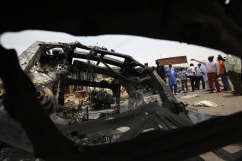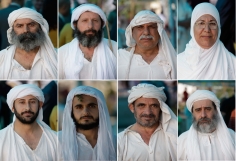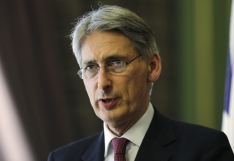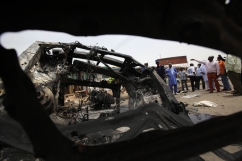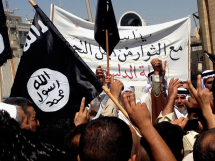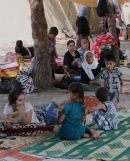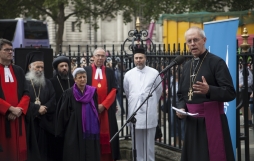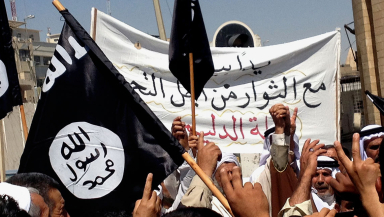
The UN Security Council is aiming to supress foreign travel to join a terrorist group by demanding countries make it illegal under domestic law.
In a draft resolution circulated yesterday, the Council said it would compel countries to make it illegal for citizens to travel abroad, collect funds or facilitate the travel of other individuals abroad "for the purpose of the perpetration, planning, or preparation of, or participation in, terrorist acts, or the providing or receiving of terrorist training", Reuters reports.
The activities of terrorist cells such as IS have been strengthened considerably by foreign fighters – 12,000 of whom have travelled to Syria and Iraq. A leading academic from Kings College London called it the most "significant foreign fighter mobilisation since the Afghanistan war in the 1980s".
Social media is making publicity and recruitment for terrorist organsiations easier than ever. Arguably, it has completely changed the way terrorists operate.
All acts of terror use media coverage to publicise their message and propagate fear and intimidation. The 9/11 attacks, for example, wouldn't have had the same global impact if people hadn't been watching it happen live, filmed by onlookers on their phones and cameras.
But IS has taken it to a new level. It has become personal, and it is much easier to trace back to particular people. We can, for instance, talk about 'Jihadi John' or the specific young men and women who have left Britain to join IS, and think about the school friends and good grades they left behind.
It's not just a good marketing campaign that is compelling people to join up in their thousands, though. For many, the attraction is in the ideology – a particular form of militant Islamism, an ideology underpinning numerous terrorist groups currently in operation.
Muslim leaders in the West have repeatedly declared that Islamic State (IS) and many others preach a corrupt form of Islam. In August, British Imams issued a fatwa (a form of religious decree) banning British Muslims from going to fight with the "oppressive and tyrannical" organisation. And again last week Imams issued a particular caution to young people, and joined in prayer for the release of hostages.
But their message of peaceful Islam has to compete in the public psyche with the videos plastered all over the news of beheadings of American journalists said to be done in Allah's name.
And it's not just IS. Boko Haram leader Abubakba Shekau said in a video in May: "I swear by Allah that we will never stop killing you, because Allah commanded us to kill people like you. If we pity you and spare you, one day you will become infidels; so to us having pity on you is an act of disbelief."
Of the British government's list of 60 international terrorist groups (and groups that glorify terrorism) about half are described 'Islamist' groups or groups with an expressed aim of wanting to establish an Islamic state.
Each of these groups face different economic and political conditions, and there may be many motivations underlying their militant ideology. Describing them as 'Islamist' denotes a degree of common ground, but we can't assume that the different groups are united.
"The core teaching of Islamists (whether violent or not) are that the revelation of Islam is entirely sufficient for the running of human society, and is the answer to every problem that human beings face – political, economic, social and legal," says Dr Caroline Tee, an anthropologist specialising in Islamic studies at the University of Bristol.
Islamism, roughly defined, is a political form of Islam. There are both militant and peaceful forms, but is often fused with a strongly anti-Western position, rejecting the perceived immorality of the West. While many Muslims would want to see some influence of Sharia in governance, Islamists seek to entirely replace secular governance with Sharia law.
Given the condemnation of IS from British Imams, how broad is the appeal of militant Islamist teaching among the world's 1.6 million Muslims?
"It's tempting to try to figure out Islamic militancy by asking how it compares to and diverges from 'mainstream' Islam, but the idea of such a mainstream (which implies some kind of orthodoxy) is in itself problematic," says Tee.
"It's often said that Islam is more concerned with orthopraxy than orthodoxy. The major sources of authority in the Muslim world are therefore legal – the Sunni world is made up of four schools of law, and each individual Muslim subscribes to one of these."
The ideology of IS has developed from Salafism, which is related to Wahabism – the official doctrine of Saudi Arabia. Salafism, which emerged in the 19<sup>th century, emphasises a literal interpretation of the Qur'an and Hadith, rather than trying to interpret the texts for the modern age.
This approach means IS can use those verses which talk about the murder of unbelievers to justify its actions. Some reformist Muslims would say these passages referred to specific battles fought during Muhammad's lifetime and are contradicted by other Qur'anic verses that prohibit killing.
"I would suggest that their methods are repulsive to a great many Muslims, but that their agenda (to aggressively take on the West and establish a religious state in the Middle East) is probably attractive to a considerable number," says Tee.
"That's arguably got much less to do with religious belief per se though, and more to do with contemporary socio-political problems and a prevailing sense of the Muslim world being the victim of Western dominance and aggression."
With the number of different groups in operation, it's easy for all Islamist militant groups to blur into one, so here is a guide to some of the major groups currently in existence:
Al-Nusra Front
A group led by Abu Mohammed al-Jawani that has emerged during the war in Syria. It pledged allegiance to Al-Qaeda in 2013 and aims to establish a caliphate in the region, but is currently fighting IS.
Al-Qaeda Core
The group has been led by Ayman al-Zawahiri since death of Osama bin Laden in 2011. They aim to take control of a number of holy sites in Saudi Arabia, as well as promoting Sharia law and aspiring to the end of Western influence in the Muslim world. There are now splinter groups and affiliated organisations in at least 16 countries, some of which have become significant entities in their own right. The launch of new Indian branch was announced last week, prompting comment that they should not be forgotten in the wake of Islamic State.
Al-Qaeda in the Islamic Maghreb
It aims to establish a Salafist state operating in the Sahara and the Sahel, which would mean overthrowing governments in Algeria, Libya, Mali, Mauritania, Morocco, and Tunisia. They pledged allegiance to Al-Qaeda (and changed their name) in 2006. The group raises funds by kidnappings for ransom as well as arms and drugs trafficking.
Al-Qaeda in the Arabian Peninsula
The group was formed in 2009 through the joining of two Al-Qaeda branches in Saudi Arabia and Yemen. It is thought to be the most dangerous of Al-Qaeda's splinter groups, with an interest in both domestic and foreign targets.
Al-Shabaab
Based in Somalia, Al-Shabaab has been fighting against the Somali Transitional Federal Government and African Union peacekeeping forces since 2007. It aims to create an Islamist state in Somalia, but has also voiced support for Al-Qaeda's global mission. Most of its activities have been focussed within Somalia, but the group was also responsible for the mass-shooting at Westgate Mall, Nairobi, Kenya in 2013. Last week a US airstrike killed its leader, Ahmed Abdi Godane.
Boko Haram
Based in northern Nigeria, this group has become more prominent since 2009, when the current leader Abubakba Shekau came to power. The group was infamously responsible for the abduction of more than 200 schoolgirls from Chibok village, Borno state in April. In August, Shekau declared a caliphate in the region they are currently occupying.
Islamic State (Formerly known as Isis – Islamic State in Iraq and greater Syria, or Isil – the Islamic State in Iraq and the Levant)
IS used to be affiliated with Al-Qaeda, but ties were formerly cut by the Al-Qaeda leadership in February 2014. Now one of the largest and wealthiest terrorist groups, having raided banks and towns as they conducted brutal attacks throughout Syria and northern Iraq. They declared a caliphate in the region in June.
Taliban
The Taliban became prominent in Afghanistan in 1994, and then controlled the country from December 1996 to December 2001. After they were toppled in the US-led war against the Taliban, they retreated to Pakistan, where they regrouped under the leadership of Mullah Omar. The insurgency against the Afghan government continues. The Haqqani network, a family-run insurgency group, officially operates under the Afghan Taliban from within north-west Pakistan.
Pakistani Taliban
Supporters of the Afghan Taliban who retreated to the semi-autonomous tribal region in north-western Pakistan, formed a separated entity in 2002. Led by Mullah Fazlullah, they seek to gain territory and enforce Sharia law in Pakistan. Fazlullah gained notoriety for ordering the attempted assassination of schoolgirl Malala Yousafzai in 2012.











